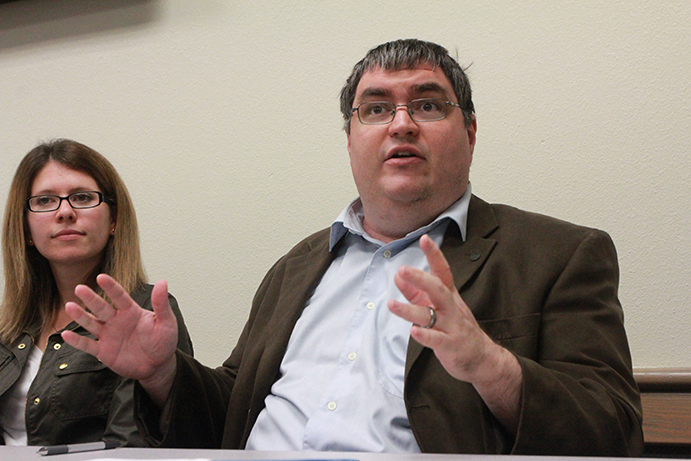The University Union’s Delta Room was filled beyond capacity as over 60 people packed into the third floor space on Tuesday to discuss the results of the 2016 election with a panel of five experts.
How president-elect Donald Trump pulled off his upset victory, issues with polling, how money and media influenced the election cycle, local ballot measure results, the electoral college and the impact that the Trump administration may have on California were among the topics discussed during the hour-long event.
“A lot of times in our culture we have a whole bunch of buildup before elections and we get overloaded with the information and then we don’t usually get together to talk about what happened,” said Kim Nalder, a professor of government at Sacramento State and the director of the Project for an Informed Electorate (PIE), the group that hosted the event. “(PIE) has a mission of informing voters and helping citizens understand more about their democracy.”
The discussion panel included Sac State government professors Andrew Hertzoff, who is also a political theorist, Danielle Martin, an American political behavior expert, and Wesley Hussey, an expert in California politics.
Rounding out the panel were Director of Legislative and External Affairs for the Fair Political Practices Commission and Sac State alum Phillip Ung, and Stacy Gordan Fisher, a retired professor of political science from the University of Nevada, Reno and an expert on money in politics.
Each of the five panelists took time to discuss their area of expertise. Though other election results were discussed, the main focus was on the presidential race.
Martin pointed out that many people were surprised by the results of the 2016 presidential election and that much of that may be attributed to polls and probability forecasts.
“A lot of the prediction models were saying that Trump was not going to win or that it was really unlikely, but we need to remember that polls are all about probabilities,” Martin said. “Even if there was just a one in three chance that Trump was going to win, that still means that there was a chance of that happening, and it did.”
Fisher discussed Trump’s populist rhetoric and why that may have been part of what led to his election. She also pointed out that populism can often lead a candidate to corruption.
“When a populist candidate wins, they won because people believe the system is broken,” said Fisher. “They usually win by saying, ‘I’m going to blow the system up,’ so their rhetoric is suggesting that, in fact, the system is broken and the only way to make it work for the people is to not follow the rules.”
Hussey addressed the fact that although Trump won the presidency, Clinton is ahead of Trump in the popular vote by a margin of over one million ballots, according to the Associated Press as of press time.
“This is the first time this has happened in American history,” Hussey said. “The other four times, there’s something I can explain to you to explain away why this was the case. I don’t know if that symbolizes a future where the parties are having different electoral constituencies and there’s a chance of this happening again or like everything else, this is a one-time, weird case that will never happen again.”
After the five panelists spoke, the floor was opened up to questions from attendees.
One student asked Ung if he thought there would be any reform to the ballot proposition process following this year’s election, when California voters decided the fates of 17 initiatives.
“You probably won’t see reform because polling has shown that voters know ballot measures are gained by special interests,” Ung said. “They know they’re funded a hundred percent by interest groups and they’re not grassroots campaigns at all. But when asked if you want to get rid of the ballot initiative process, overwhelming amounts of voters say no. More of them trust the initiative process than the legislature.”
Nadler said that although this event was planned months in advance, it’s particularly important to have these types of discussions with an election as emotionally-charged and divisive as this one.
“I’ve never, in my career, had students come up after an election and want a hug, and that has happened this year,” Nadler said. “I think a lot of our student body are in the groups that Trump targeted in some of his campaigns and are feeling afraid. When we have discussions like this, we normalize, we analyze and we think it through in a rational way and I think that always helps to sort of put things in perspective.”





























































































































